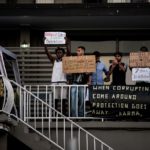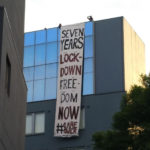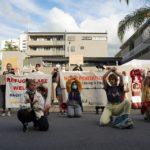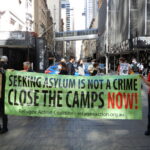Call Minister Tudge to Save Refugees’ Phones: An Interview With Mostafa Azimitabar

Refugees and their advocates are organising a calling party for 1 September that will involve members of the public phoning the office of acting immigration minister Alan Tudge to let him know that proposed laws allowing for the confiscation of immigration detainees’ phones are not on.
Tudge introduced the Prohibiting Items in Immigration Detention Facilities Bill to federal parliament in mid-May, marking a second attempt by the Coalition government to try and silence the voices of refugee and asylum seeker detainees.
“Mobile phones are a lifeline to the outside world that enables individuals to maintain their sanity and communicate with their families, their loved ones, the community, their advocates and their legal representatives,” said National Justice Project director George Newhouse in late May.
#ShameAlanTudge
The acting immigration minister has been banging the same drum that home affairs minister Peter Dutton does when he wants to enact some draconian law. This has entailed Tudge spouting claims about child abusers being detained in immigration facilities.
But when you look at the 180-odd former offshore detainees being held in hotels in capital cities, they were brought here under the Medevac laws and it’s common knowledge that the immigration department did a thorough background check on each of them before they were brought over.
Indeed, the men at Melbourne’s Mantra Hotel and Brisbane’s Kangaroo Point Hotel have been cooped up inside during the pandemic without any room to allow for social distancing from one another or the guards. And both hotels have had instances of staff testing positive to COVID-19.
Sydney Criminal Lawyers spoke with Mantra refugee and Kurdish musician Mostafa Azimitabar about what the calling party will involve, how the men inside are feeling about the pandemic, and why phones are so important to these innocent and isolated people.
Firstly, on 1 September, a calling party has been organised that will involve people phoning acting immigration minister Alan Tudge to let him know that Australians are upset about plans to enact new laws to allow for the removal of immigration detainees’ phones.
Moz, what are you hoping will happen on the day?
I hope Alan Tudge will see that people in Australia are looking at us as humans, and that they don’t discriminate people.
What the Australian government has been doing is driving fear into the nation by saying refugees are bad.
For seven years they have imprisoned us. And after seven years of torture, they call us illegal boat people and child abusers.
Over the past few weeks, minister Tudge has been using the power of language to cloud the truth and manipulate the people of Australia for political gain.
Minister Tudge is well aware that every single one of the refugees transferred to Australia under the Medevac legislation has undergone extensive background and criminal checks and were individually approved by his own department to be transferred to Australia.
This means we’re not criminals.
The federal government wants to pass these laws so that detainees’ phones can be confiscated. What would it mean for refugees in detention if they have their phones removed?
The only way that we can talk with our families and friends is on our phones. If we don’t have our phones, then they have disconnected us from our family and friends.
We’re locked up inside this place 24 hours a day. My life is the size of this room, a narrow corridor and a kitchen, when I want to drink tea.
Imagine if they take my phone, what can I do inside the room all the time.
I need to keep my health okay. I don’t want to go crazy. But what they’re doing is trying to break us – to disconnect us with other people.
And how can I talk with my lawyer and keep the government to account. We need to continue to show people what the Australian government is doing is wrong.
That’s why they’re going to confiscate our phones.
Melbourne is now in its second lockdown. You and the other 60-odd detainees at the Mantra are confined together inside during this pandemic. And there has been one case of a hotel staff member testing positive to COVID-19.
How are you all feeling in there?
Everyone is panicking. I personally feel that the virus is outside the room. That’s why I always keep myself inside.
But the problem is that several times a day, the officers enter the room. I worry they may have coronavirus, and I feel one day I may catch it. It’s a very stressful time.
The irony is we have been transferred to Australia for treatment, but now we’re locked up in danger.
So, you’re staying in your room during the day because you’re concerned about COVID, but the guards are required to enter the room?
Yes, they come to the room every day for different reasons. I am not judging them. They’re following the rules. They’re here to enforce the ABF rules.
These rules are hurting us. These rules are really breaking our hearts.
We cannot have visits from our friends because of COVID-19. We have been deprived of sunlight for around 150 days. And this virus is like more torture.
And there was a staff member that contracted COVID?
Yes. It was not a Serco guard. The work of this staff is different. They are inside the third floor. They’re close to the main doors, in order to make sure no one escapes.
When I saw the people who were cleaning for the coronavirus in the clothes they wear, I was really scared. I thought, I’m going to catch this virus.
When I see that one of the officers has a runny nose or is coughing, I really feel that the virus could be inside, and I get anxious.
Moz, you’re a musician. And you recently released your new song Love. It was recorded over the phone and produced by Midnight Oil guitarist Jim Moginie. And you used a guitar Jimmy Barnes gave you.
What was that experience like?
It is a privilege for me to know these wonderful human beings. They absolutely know the meaning of love and humanity.
When I finished the song, I sent it to Jim Moginie and I wanted to know his opinion. He really loved it. He said, “This song is very catchy but not like the virus.” He produced the song for me.
And this is it, I recorded the song over the phone, if I didn’t have the phone, how could I be in touch with these people?
And lastly, what sort of reaction do you hope the calling party results in?
Hopefully, thousands of people are calling. Everyone is free to create anything that they like for this event.
We want this minister to stop hurting us. He is a minister, so he should respect everyone in this society, because I believe everyone in this society is like a family.
But Alan Tudge and his political accomplices are discriminating against and separating us from the rest of society.
We’re living inside the society, so why do we have to be tortured? Why is this person attacking us and labelling us as bad people and illegals?
We want him to stop talking about us in this way. This is no good.
Also, there are some questions inside the event about the two children of the Tamil family. They were born in Australia.
But this government is spending more than $30 million to keep this one family on Christmas Island.
They call these children illegal. I feel that this person is a sadist. Why should children be in detention? The child abusers are those who keep children in detention.
We will never forget that for six years they tortured and imprisoned children on Nauru. This is the meaning of child abusers.







